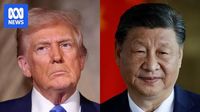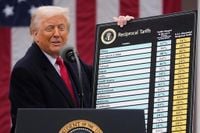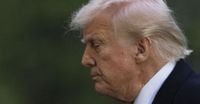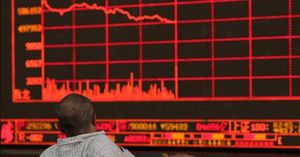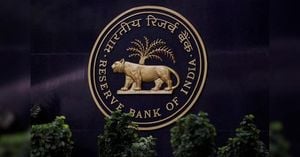In a dramatic escalation of trade tensions, President Donald Trump has threatened to impose a staggering 104 percent tariff on imports from China if Beijing does not retract its recent 34 percent tariff on U.S. goods. This warning, issued via Trump's social media platform Truth Social, comes as global stock markets continue to reel from the fallout of his administration's aggressive tariff policies.
Trump's ultimatum was clear: "If China does not withdraw its 34% increase above their already long-term trading abuses by tomorrow, April 8th, 2025, the United States will impose ADDITIONAL Tariffs on China of 50%, effective April 9th. Additionally, all talks with China concerning their requested meetings with us will be terminated!" This latest threat signifies a potential shift in U.S.-China relations, with tariffs poised to reach a crippling total.
The backdrop to this escalating trade war includes a series of tariffs already implemented by the Trump administration. Since returning to office, Trump has imposed a 20 percent tariff on Chinese imports linked to fentanyl trafficking, and the new 34 percent tariff is set to kick in on April 9, bringing the total to 54 percent. If Trump's additional tariffs are enacted, the cumulative rate would soar to 104 percent.
As Trump doubles down on his tough trade stance, markets are reacting with volatility. On April 7, 2025, the Dow Jones Industrial Average fell by 750 points, or 2 percent, while the S&P 500 and Nasdaq Composite also experienced significant losses. The previous week had already seen a market decline of over $5 trillion, a stark reminder of the economic consequences of Trump's tariff policies.
Trump's threats have drawn sharp criticism from both domestic and international leaders. Kelly Ann Shaw, a trade lawyer and former White House adviser, remarked, "This is the single biggest trade action of our lifetime," highlighting the seismic shift in global trade dynamics. Meanwhile, European Commission President Ursula von der Leyen indicated that the European Union would seek to enhance trade relationships outside of the U.S. in response to Trump's tariffs.
China has responded to Trump's tariff threats with its own measures, implementing a 34 percent tariff on all American imports as a counteraction. The Chinese government has not yet publicly commented on Trump's latest threats, but experts suggest that Beijing is unlikely to back down. Yun Sun, director of the China program at the Stimson Centre, stated, "At this point, it is extremely unlikely for China to back down," emphasizing the entrenched positions of both nations.
As the U.S. prepares to roll out its new tariffs, the impact is already being felt across various sectors. American businesses are bracing for increased costs, with many companies likely to pass these expenses onto consumers. For instance, the automotive industry is particularly vulnerable, with manufacturers like Jaguar Land Rover pausing shipments to the U.S. in anticipation of the new tariffs.
In the midst of this turmoil, the Trump administration has signaled its intent to negotiate with other countries while maintaining a hardline stance against China. Trump stated, "We're going to get fair deals and good deals with every country, and if we don't, then we're going to have nothing to do with them." This approach has left many wondering whether the U.S. is genuinely open to negotiations or simply using tariffs as a bargaining chip.
Investors are keenly watching for any signs of a potential pause in tariff implementation, especially after a false report suggested that the Trump administration was considering a 90-day delay. The White House quickly dismissed this as "fake news," further contributing to market instability. As the situation unfolds, stock futures have already plummeted, with projections indicating a continued downturn.
The implications of Trump's tariffs extend beyond immediate economic consequences. Goldman Sachs has revised its forecast, suggesting that the likelihood of a U.S. recession has increased significantly. The financial firm noted that economic growth would slow dramatically due to tightening financial conditions and rising policy uncertainty.
As Trump continues to assert his commitment to his tariff policies, he faces mounting pressure from business leaders and economists who warn of the risks associated with such aggressive trade measures. Billionaire hedge fund manager Bill Ackman publicly criticized the administration's approach, stating, "I am just frustrated watching what I believe to be a major policy error occur after our country and the president have been making huge economic progress that is now at risk due to the tariffs."
In the face of this criticism, Trump remains defiant. He has called on the Federal Reserve to lower interest rates, arguing that his tariffs are necessary for rebuilding domestic manufacturing and resetting trade relationships. On April 6, he declared, "Sometimes you have to take medicine to fix something," reiterating his belief in the long-term benefits of his trade policies.
As the deadline for China's response approaches, the world watches closely, anticipating the next move in this high-stakes trade war. With negotiations with other countries already underway and tensions between the U.S. and China escalating, the outcome of this tariff saga remains uncertain. The stakes are high, and the potential for economic fallout looms large over global markets.
In summary, President Trump's latest tariff threats against China signal a significant escalation in the ongoing trade war, with potential repercussions for the global economy. As markets react and countries prepare for further negotiations, the coming days will be crucial in determining the future of U.S.-China trade relations.
